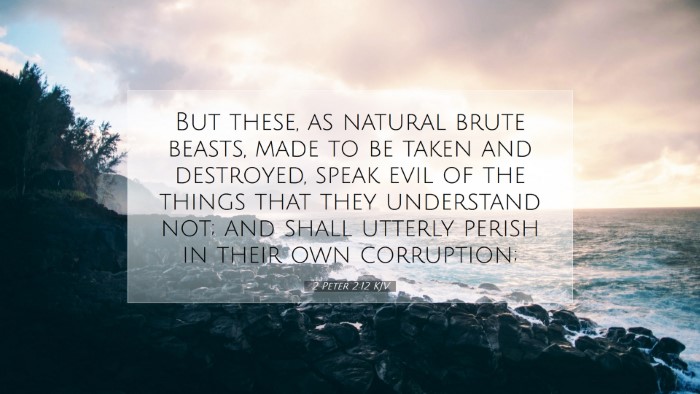Old Testament
Genesis Exodus Leviticus Numbers Deuteronomy Joshua Judges Ruth 1 Samuel 2 Samuel 1 Kings 2 Kings 1 Chronicles 2 Chronicles Ezra Nehemiah Esther Job Psalms Proverbs Ecclesiastes Song of Solomon Isaiah Jeremiah Lamentations Ezekiel Daniel Hosea Joel Amos Obadiah Jonah Micah Nahum Habakkuk Zephaniah Haggai Zechariah Malachi2 Peter 2:12
2 Peter 2:12 KJV
But these, as natural brute beasts, made to be taken and destroyed, speak evil of the things that they understand not; and shall utterly perish in their own corruption;
2 Peter 2:12 Bible Commentary
Commentary on 2 Peter 2:12
Verse Text: "But these, as natural brute beasts, made to be taken and destroyed, speak evil of the things that they understand not; and shall utterly perish in their own corruption."
Introduction
In this verse, the Apostle Peter warns the early Christian community about false teachers and their destructive behaviors. This portion of Scripture serves as a sobering reminder of the consequences of ignoring divine authority and pursuing unrighteousness.
Exegesis and Context
This epistle of Peter is generally accepted as a letter addressing concerns about false teachers infiltrating the church. Chapter 2 specifically highlights the characteristics of these teachers, which are reflective of broader moral and spiritual decay. Peter uses vivid language to describe the depravity of these individuals, emphasizing their animalistic instincts compared to true believers, who should exhibit spiritual maturity and discernment.
Natural Brute Beasts
Peter categorizes the false teachers as "natural brute beasts," a phrase indicating their lack of spiritual insight and moral understanding. Matthew Henry notes that "these teachers act upon base instincts rather than by reason or principles of righteousness." Their actions and words lack depth; they are governed by the flesh rather than guided by the Holy Spirit.
Understanding and Ignorance
The second part of the verse mentions that they "speak evil of the things that they understand not." Albert Barnes elaborates that "this signifies their willful ignorance, attributing their condemnation to their failure to comprehend divine truths." This rejection of knowledge positions them as enemies of God’s truth, leading them further into corruption.
Consequences of Corruption
Peter warns that these false teachers "shall utterly perish in their own corruption." Adam Clarke points out that "this signifies a complete and irreversible judgement, where those who mislead others will face the ultimate consequence of their actions." The stark warning serves both as a caution to the deceivers and as a reassurance for the faithful, emphasizing God's justice and the inevitability of judgement against unrighteousness.
Theological Implications
This verse raises important theological considerations concerning human nature, accountability before God, and the nature of true teaching. It underscores the dual nature of humanity—being created in the image of God, yet capable of great depravity when led astray.
- Human Nature and Corruption: The term "natural brute beasts" conveys a key understanding of the fallen human condition. Sin induces a reversion to base instincts, distancing humanity from the inherent dignity given by God at creation.
- Accountability: The warning against speaking evil of spiritual truths highlights that ignorance is no excuse before God. Those entrusted with revealing God's word have a responsibility to comprehend and articulate truth faithfully.
- Divine Justice: The promise of perishing in their corruption emphasizes God’s ultimate authority over judgement. The faithful find assurance in God’s righteous character, ensuring that justice is served, while false teachers find no safety in their deception.
Practical Applications
For pastors, students, and theologians, 2 Peter 2:12 offers profound insights applicable to ministry and theological study:
- Discernment: Leaders are urged to develop discernment in distinguishing between sound teaching and deception. Equipped with spiritual insight, they can safeguard their communities against falsehood.
- Knowledge of Scripture: Emphasizing the importance of sound hermeneutics, the commentary encourages a diligent study of Scripture. Knowledge of the Word guards against the subtlety of false teachings.
- Accountability and Humility: Recognizing the human propensity for error evokes a spirit of humility among those who teach. Regular introspection regarding one’s motives and understanding fosters a healthy teaching environment.
- Hope in God’s Justice: Pastors and believers are reminded of the eventual triumph of divine justice, assuring them that corrupt teachings will not endure, and encouraging perseverance amid struggles against false narratives.
Conclusion
2 Peter 2:12 serves as an urgent call to be vigilant against falsehood while grounding oneself in truth. It encapsulates the dire consequences faced by those who depart from God's way, while also affirming the enduring hope found in God’s righteousness and ultimate justice. In an era rife with misinformation, this passage resonates with renewed urgency for believers to pursue and uphold the truth of God's word.


